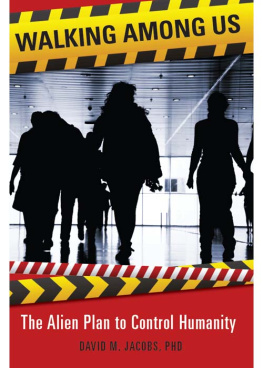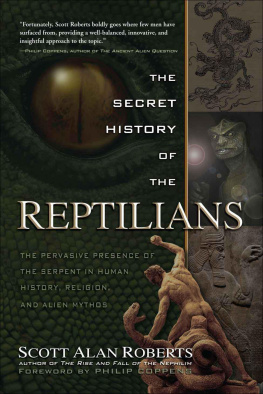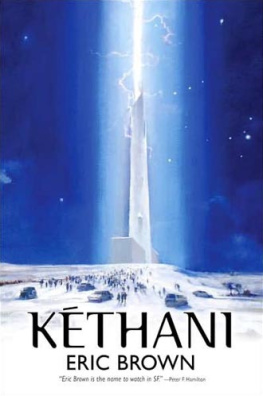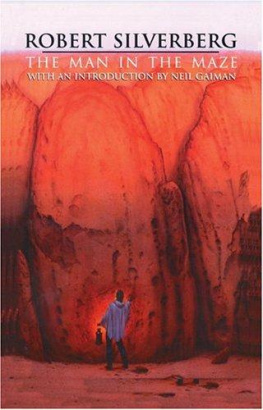Len Kasten - Alien World Order: The Reptilian Plan to Divide and Conquer the Human Race
Here you can read online Len Kasten - Alien World Order: The Reptilian Plan to Divide and Conquer the Human Race full text of the book (entire story) in english for free. Download pdf and epub, get meaning, cover and reviews about this ebook. year: 2017, publisher: Bear & Company, genre: History. Description of the work, (preface) as well as reviews are available. Best literature library LitArk.com created for fans of good reading and offers a wide selection of genres:
Romance novel
Science fiction
Adventure
Detective
Science
History
Home and family
Prose
Art
Politics
Computer
Non-fiction
Religion
Business
Children
Humor
Choose a favorite category and find really read worthwhile books. Enjoy immersion in the world of imagination, feel the emotions of the characters or learn something new for yourself, make an fascinating discovery.

- Book:Alien World Order: The Reptilian Plan to Divide and Conquer the Human Race
- Author:
- Publisher:Bear & Company
- Genre:
- Year:2017
- Rating:5 / 5
- Favourites:Add to favourites
- Your mark:
- 100
- 1
- 2
- 3
- 4
- 5
Alien World Order: The Reptilian Plan to Divide and Conquer the Human Race: summary, description and annotation
We offer to read an annotation, description, summary or preface (depends on what the author of the book "Alien World Order: The Reptilian Plan to Divide and Conquer the Human Race" wrote himself). If you haven't found the necessary information about the book — write in the comments, we will try to find it.
Len Kasten: author's other books
Who wrote Alien World Order: The Reptilian Plan to Divide and Conquer the Human Race? Find out the surname, the name of the author of the book and a list of all author's works by series.
Alien World Order: The Reptilian Plan to Divide and Conquer the Human Race — read online for free the complete book (whole text) full work
Below is the text of the book, divided by pages. System saving the place of the last page read, allows you to conveniently read the book "Alien World Order: The Reptilian Plan to Divide and Conquer the Human Race" online for free, without having to search again every time where you left off. Put a bookmark, and you can go to the page where you finished reading at any time.
Font size:
Interval:
Bookmark:
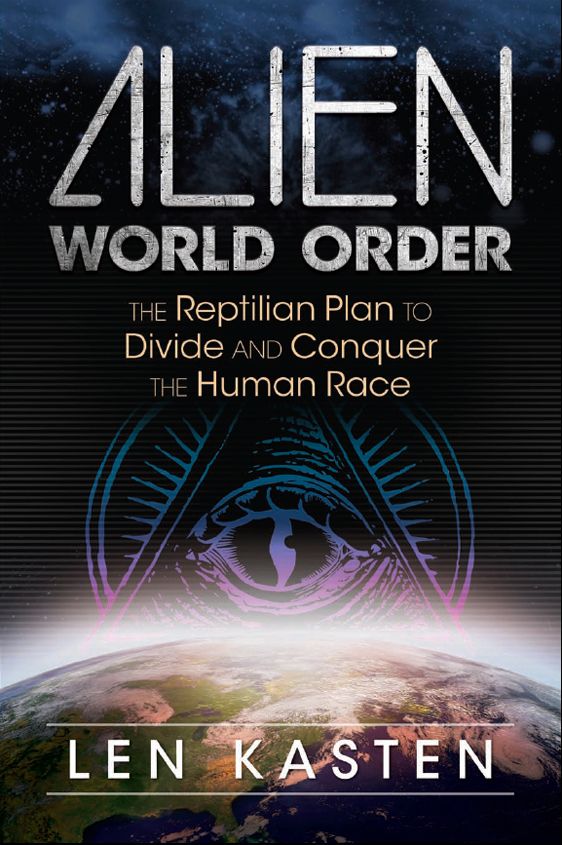
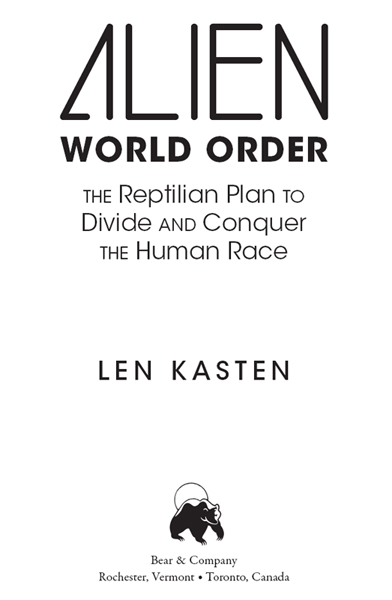
ALIEN
WORLD ORDER

In Alien World Order, Len Kasten provides a coherent account of the history and imperialistic activities of Reptilian extraterrestrials on Earth and the Milky Way galaxy over millennia, using the work of Robert Morning Sky, Stuart Swerdlow, Alex Collier, and other primary sources. The scope of Reptilian influence over human elites and society is breathtaking and provides an explanation for many of the historical ills afflicting humanity. Kasten peels back the layers of secrecy even further to reveal the dire situation we collectively face todaywhere our political leaders are vassals for imperialistic Reptilian aliensand the need for an informed citizenry to take back their sovereign destiny.
MICHAEL E. SALLA, PH.D., AUTHOR OF
INSIDERS REVEAL SECRET SPACE PROGRAMS & EXTRATERRESTRIAL ALLIANCES
Veteran UFO researcher Len Kasten has built a terrifying scenario of his findings about the aliens historical background and their future intent to control Earth. Along with different alien types, Kastens book focuses on the often reported reptilian-like beings and their nefarious plans. This book should be read by all those concerned with putting the pieces of the alien puzzle together.
DAVID M. JACOBS, PH.D., AMERICAN HISTORIAN AND
AUTHOR OF WALKING AMONG US:
THE ALIEN PLAN TO CONTROL HUMANITY
Len Kastens Alien World Order makes a compelling, well-documented case for the historical and ongoing competition between the Reptilian Draco Empire, with its program of hate, and the Galactic Federation, with its program of love. I urge you to read this book; the more of us who do, the more likely well prevail against the Dracos and, with help from the Galactics, lift Earth to a planet of peace, cooperation, and encouragement for all.
SASHA (ALEX) LESSIN, PH.D., AUTHOR OF
ANUNNAKI: GODS NO MORE
Len Kasten has courageously pieced together a lost history that goes far beyond our current understanding of who we are and where we come from. He has mapped out a new cosmology that takes us back to the stars, revealing the hidden stories of our galactic history, which include the cast, characters, and politics involved. The information within these pages allows us to take a giant leap forward to a deeper knowing that has always been encoded within our DNA. This hidden history has been patiently waiting to be revealed when we are ready to face the deep spiritual and psychological questions that arise from this knowing. Are you ready?
JASON QUITT, COAUTHOR OF FORBIDDEN KNOWLEDGE: REVELATIONS OF A MULTI-DIMENSIONAL TIME TRAVELER
As always, Len Kasten writes in an articulate, thoughtful, and compelling manner. Alien World Order presents a profound and cohesive look behind the scenes at the massive, sinister alien agenda that is interwoven with planet Earths long history. I highly recommend Lens new book!
EDWARD T. MARTIN, AUTHOR OF
KING OF TRAVELERS: JESUS LOST YEARS IN INDIA
Len Kasten has his hand on the pulse of historical truth regarding the most denied reality on planet Earth today.
CARRIE LESPERANCE, AUTHOR OF SOUL BREATHING: SPIRITUAL LIGHT AND THE ART OF SELF-MASTERY
A psychedelic overview of the alien agenda. From ancient aliens to the New World Order and secret space programsits all here in a rip-roaring read.
XAVIANT HAZE, AUTHOR OF ALIENS IN ANCIENT EGYPT
INTRODUCTION
From Prophecy to Reality
The science-fiction classic The Time Machine by H. G. Wells was first published as a novel in 1895. It was based on his short story The Chronic Argonauts, written in 1888 while Wells was a student and published in his college newspaper. Written, as it was, prior to the scientific and technological breakthroughs of the early twentieth century, it would be expected to be weak in terms of scientific speculation. But remarkably, the story contained a complete description of the concept of space-time, designating time as the fourth dimension of space, twenty years before Einstein unveiled his theory of special relativity! It also offered some interesting social insights. In his visit to the distant future in The Time Machine, the inventortime traveler encounters a civilization of simple-minded, pleasure-seeking young people, the Eloi, who live in an earthly paradise of beauty and leisure. But underground there is a different society. There lives a race of apelike creatures, the Morlocks, who run the machinery that permits the pleasures of the surface world to exist. The time traveler at first assumes that this subsurface worker race has been enslaved by the Eloi to do all the hard labor necessary to keep their paradise functioning. However, the time traveler discovers that periodically the Morlocks put the Eloi into a trance, and then batch consignments of the young people are brought underground to become food for the cannibalistic Morlocks. The Morlocks allow the Eloi to enjoy their surface playground, but they are being kept like cattle in a pasture, for food.

Fig. I.1. Movie poster for The Time Machine
Although it appeared to be pure science fiction, the novel seemed to have its origins in Wellss pessimistic views about the future of humanity. Some critics claim it reflected a socialist orientation since its bleak view of the future appeared to be an indictment of industrialization and capitalism. It is true that Wells was a socialist, later joining the Fabian Society, a British organization that endorsed socialism as the answer to the economic ills of the time. He even sought to become the president of the society. In a visit to Russia in 1920, he met with Vladimir Lenin and Leon Trotsky, the progenitors of the Russian Revolution, and a decade later he met with Josef Stalin. Given his communist leanings, it would be logical to conclude superficially that The Time Machine is a vision of the likely final days of capitalism. And Wells appears to admit as much when he says on the last page, He, I knowfor the question had been discussed among us long before the Time Machine was madethought but cheerlessly of the Advancement of Mankind, and saw in the growing pile of civilization only a foolish heaping that must inevitably fall back upon and destroy its makers in the end. Yet, this sordid ultimate chapter in the history of mankind on this planet doesnt really make sense as any sort of acceptable prognostication of the far future. How anyone of Wellss intellect could believe that we would come to such an end is inconceivable. If Wells had lived after the advent of the atomic bomb, it might be believable that he thought that we would destroy civilization in a final catastrophic war. But the idea of the human race reverting back to troglodytes and simple, senseless, inarticulate little people is absurd. As a race, in general, we are already approaching a state of advanced spirituality and scientific sophistication.
Certainly we could not revert back to apes and idiots in eight hundred thousand years! More likely, we will be godlike beings colonizing other planets or distant stars. So, since it really makes no sense from a prophetic viewpoint, how could this novel have remained a classic for more than a century, spawned two Hollywood films, and inspired countless sequels and spin-offs? As we will see, we may have underestimated Wellss prophetic powers, and there may be much more to this story than is immediately apparent.
Next pageFont size:
Interval:
Bookmark:
Similar books «Alien World Order: The Reptilian Plan to Divide and Conquer the Human Race»
Look at similar books to Alien World Order: The Reptilian Plan to Divide and Conquer the Human Race. We have selected literature similar in name and meaning in the hope of providing readers with more options to find new, interesting, not yet read works.
Discussion, reviews of the book Alien World Order: The Reptilian Plan to Divide and Conquer the Human Race and just readers' own opinions. Leave your comments, write what you think about the work, its meaning or the main characters. Specify what exactly you liked and what you didn't like, and why you think so.

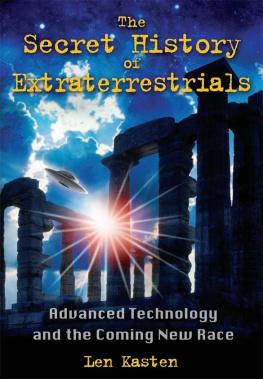

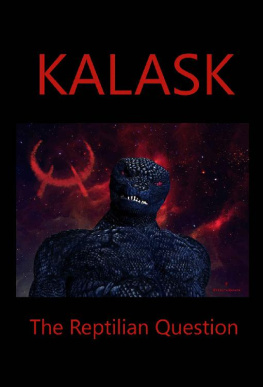
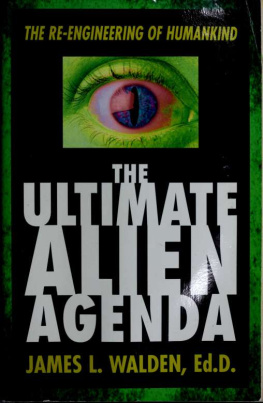
![David Icke [Icke - Children of the Matrix; How an Interdimensional race has controlled the world [reptilian]](/uploads/posts/book/145196/thumbs/david-icke-icke-children-of-the-matrix-how-an.jpg)
